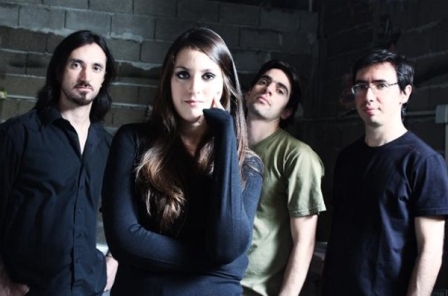A middle-aged couple hired a young girl to look after their kids while they attended a party. The girl arrived early in the evening, and she stayed with the children as the couple went their way.
And everything was going fine, until the husband’s mobile rang. It was the girl, she wanted to know if she could cover the clown’s statue in the kid’s room because the children were scared by it, and they couldn’t get to sleep. The man said we don’t have a statue of a clown in our house, quick get the kids out and call the police.
It turned out the clown was a convict who had broken into the house.
And if you don’t copy and paste this text in the wall of five of your Facebook friends, tonight at 3 AM the clown will be at your bed, with a chainsaw in his hands.
OK, I’m sorry. I’m sorry. That was too good a chance to miss. I’m sorry. I won’t ever do that again, I swear by God almighty and by my High School Musical DVD.
Today, it’s time to cover a new Uruguayan artist on this blog. And I’ve found one that has got quite an interesting background. His name is Federico, and in addition to being a recording artist of his own he runs an independent label named Nikikinki Records. This label gathers together a distinctive number of Uruguayan performers, but some international acts have been joining its ranks recently.
So, if you visit Nikikinki’s website you’ll be able to download music from local performers such as Ari Vinitzki, Lila Tirando a Violeta, Fabián Echandía and Turra Total, along with Eric Bejaranbo (from Mexico) and Johnny Slidell (from the US) to name just a few.
In all cases, the music you can find on the site is available at zero cost. You just have to submit your e-mail address, and that’ll be the start of a thousand lives with the music of this league of extraordinary gentlemen.
Federico himself has released two volumes of love songs named “Los Amores Imaginarios” [Imaginary Loves], and he also fronts a band which goes by the name of “Julen y la Gente Sola” [Julen and the Lonely People]. I became familiarized with his work while I was online one day, goofing around on Facebook. I came across a live performance of his, he had posted a song named “Asuntos Ajenos” [Other People’s Businesses], and I gave it a whirl. Usually, I click on such videos and then keep on scrolling down my news feed. And that’s precisely what I did when I first crossed paths with “Asuntos Ajenos”.
But I didn’t get very far. A couple of seconds into the performance, I stopped scrolling down. I was listening.
And when Federico started singing, I had to scroll up again to see him play. There was a sort of magnetism both in his voice and his overall demeanor. You couldn’t call it technical prowess, you couldn’t call it interpretative proficiency or smoothness. But it was some sort of coruscating quality all the same.
And you know, that’s good news. Really good news. That’s what I always want to see on young performers.
Frankly, I was amazed. I mean, not amazed in the same way Taylor Swift is amazed at awards shows, and she puts her patented OMG face on, like this:

(If you look carefully, you’ll also notice that when this happens Taylor Lautner is always, always on the very first row. He’s staring all dove-eyed at T Swizzle, until he realizes the cameras are on him! And when that happens, he turns his head with haste, as if thinking “Oops, I’m not supposed to harbor feelings for her any longer!”
I hate you! Vile monster! How could you break our sweetheart of the rodeo’s heart?! Hope they cast you in a suckass saga with endless sequels! Hope you’re condemned to do the same mediocre role for ever!
Oh, wait…)
But I was surprised by how much Federico could elicit, by how much he could transmit in a way that seemed so effortless. And I decided to take a closer look at his work.
So, I downloaded the first volume of his “Amores Imaginarios”. And that’s the album I want to tell you about today.
According to the liner notes, Federico recorded the 12 songs that are included between 2009-2011 on his bedroom, using an acoustic guitar and his computer. This is a lo-fi album by definition, so that if you’re enamored with Okkervil River’s marauding guitars on songs such as “We Need A Myth” then I’m afraid you’ll have to browse. This album is not about sounding good, it’s about conveying ideas in a way that’s unembellished and completely spontaneous.
We could debate incessantly how valuable such a thing is from an artistic point of view; writers like Victor Hugo used to claim that there’s nothing more detrimental to art than the rush of inspiration, that ideas have to be diligently refined, and that the greatest works come from a process in which corrections and reformulations are always in order. Conversely, authors like Byron (who were uttermost expressionists) felt that saying what one had to say in the way that it would naturally come out was the fairest thing to do.
How much you’ll get from an album like this one (and from most of Nikikinki’s oeuvre, actually) depends on where you stand on this debate. If you collapsed to the floor and cried aloud “Deflower me! Deflower me, Dave!!” when the Foo Fighters won their last Grammy Award and Grohl mentioned that they had recorded the album at their very own garage, then look no further than this. Continue reading





